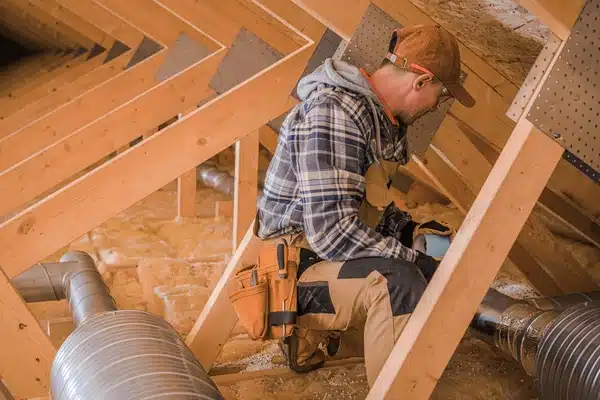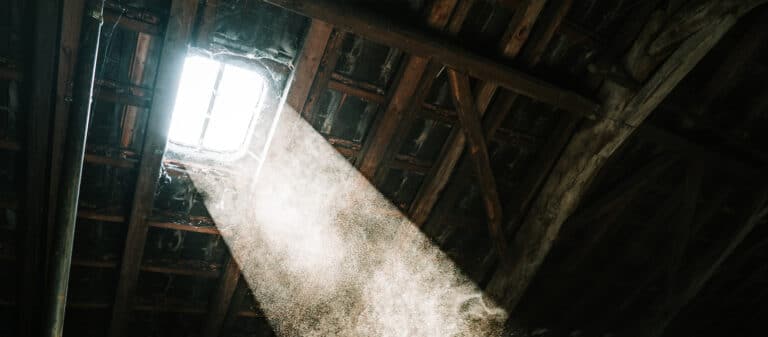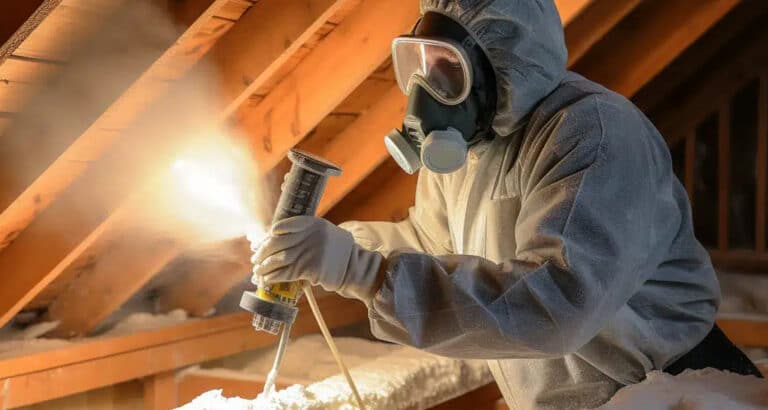You’re all set to enhance your attic with new insulation, and the idea of adding air sealing has been suggested.
But is the extra step truly beneficial?
Imagine transforming your Northeastern Pennslyvania attic into a fortress of efficiency, where air sealing acts as a guardian, locking in comfort and locking out energy waste.
This isn’t just a minor upgrade; air sealing services are a game-changer for your HVAC system, ensuring energy loss is kept to an absolute minimum.
By most conservative estimates, air sealing and insulating your attic together can help you save 15% of your home energy costs.
Dive into this guide, where we’ll unravel how air sealing works, highlight compelling reasons to prioritize it in your home improvement journey, and demonstrate why air sealing stands out as an essential upgrade for any home.
How Air Sealing Works
Air sealing weatherizes your home, preventing outside air from leaking in and inside air from leaking out.
Attics are typically the primary beneficiary of an air seal because this is where most energy loss occurs in the home. By some estimates, anywhere from 20-40% of heat loss may occur in an attic, depending on its level of insulation!
Air sealing a home does not involve one single process but utilizes a collection of several materials and steps, such as:
- Flashing openings around pipes, flues, and chimneys
- Stuffing insulation into joists, soffits, and uncovered spaces
- Caulking and spraying foam into smaller holes
All air seal projects are different and arrive with different quotes and recommendations based on the age and existing insulation found in your attic.
Air Sealing and Insulation: What’s the Difference?
Since air sealing helps protect your home from air leaks, it is ideal to air seal before you insulate your attic to maximize the benefits of both services.
However, air sealing and attic insulation are typically recommended together as they maximize utility savings when done in tandem.
Air sealing involves insulation and several other materials to create an air seal in areas where heat transfer is noticeable.
For the most part, air sealing projects utilize fiberglass batts that are flexible or thin enough to shove in small crevices and openings.
Spray foam insulation may also be used for air sealing projects, and many homeowners can save money when they bundle both services together.
9 Benefits of Air Sealing
Like brand-new insulation, air sealing offers homeowners many of the same insulation benefits.
1. Increased Energy Efficiency
When your attic is not properly sealed, conditioned air from your home can escape, leading to increased energy consumption and higher utility bills. Conversely, outdoor air can infiltrate, making it harder to maintain a comfortable temperature indoors.
Air sealing an attic reduces HVAC system usage and saves you money on bills, helping you recuperate money from your investment quickly.
2. Improved Insulation Performance
Air sealing works hand in hand with insulation. Without proper air sealing, even the best insulation may not perform optimally. Sealing gaps and cracks ensures that the insulation can do its job effectively, keeping your home cooler in the summer and warmer in the winter.
3. Enhanced Comfort
A well-sealed attic contributes to consistent indoor temperatures. This means fewer drafts, hot or cold spots, and a generally more comfortable living environment for you and your family, even on lower-level floors where heat still escapes.
4. Moisture Control
Proper air sealing helps prevent the entry of moisture into the attic space, reducing the risk of mold growth and potential damage to your home’s structure.
5. Pest Prevention
Gaps and openings in the attic can serve as entry points for pests. Air sealing acts as a barrier, helping to keep unwanted visitors like rodents and insects out of your home.
6. Long-Term Cost Savings
While the initial investment in air sealing may seem like a hefty expense, it translates to long-term cost savings. Reduced energy bills, improved HVAC system efficiency, and minimized repair costs make air sealing a financially sound decision.
7. Increased Lifespan of HVAC Systems
When your HVAC systems don’t have to work as hard to maintain indoor temperatures, their lifespan is extended. Regular maintenance costs are reduced, and the need for premature replacements is minimized.
8. Improved Indoor Air Quality
Air leaks not only allow conditioned air to escape but also enable pollutants to enter your home. Proper air sealing improves indoor air quality by preventing the infiltration of dust, allergens, and outdoor pollutants infiltration.
9. Home Durability
Moisture infiltration, often a result of air leaks, can compromise the structural integrity of your home. Air sealing helps protect against moisture-related issues, ensuring the durability of your home over time.
Can I Air Seal a Home on My Own?
While the financial benefit of air sealing your home may be too good to pass up, DIY air sealing is considered incredibly difficult and somewhat dangerous. It’s always important to consult a professional to ensure your home is properly ventilated and no moisture problems occur after installation.
Likewise, purchasing the materials required to air seal a home and install them may not be worth it for many homeowners.
Is Sealing the Attic Worth It?
Air sealing is a worthwhile investment that can translate to lower energy bills, increased comfort, and reduced allergens.
For all your air sealing needs in Northeastern Pennsylvania, contact the experts at EnergySmart. We offer fast and reliable service without delays and work with homes, new and old.
FAQs
How Long Does It Take to See Energy Savings?
The time frame varies, but many homeowners notice a reduction in energy bills within a few months. The payback period depends on factors like energy costs, the extent of sealing, and home efficiency.
Is Air Sealing Effective in All Climates?
Yes, air sealing is effective in all climates. It helps conserve energy by preventing conditioned air from escaping and outside air from entering, regardless of whether you’re dealing with hot or cold climates.










